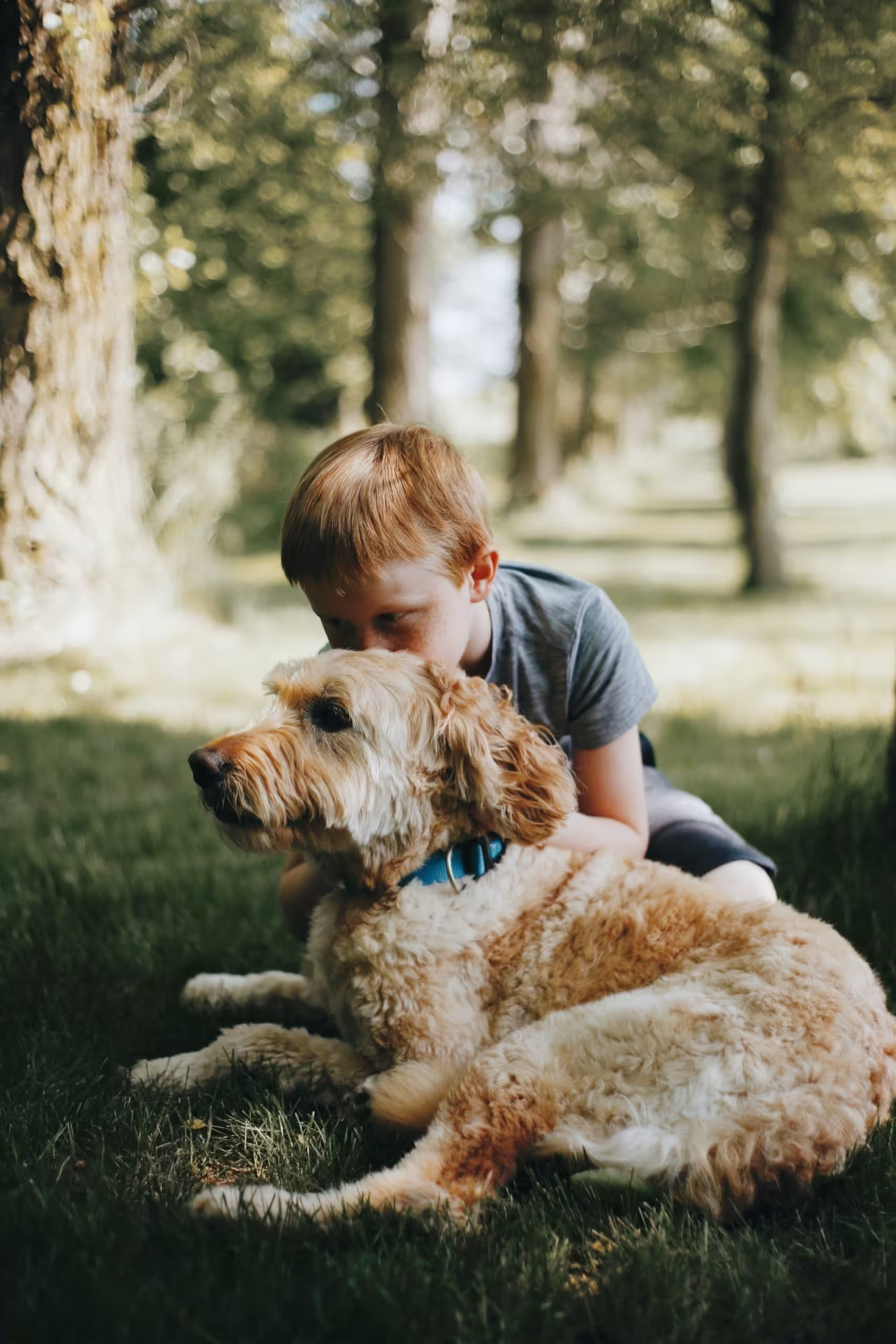We frequently get questions in our Community about service dogs. How do I get one, how much does it cost, is it right for me? We’ve put together some of the commonly asked questions to help you consider whether an autism service dog is right for your twins, triplets or quadruplets.
What is an autism service dog?
Autism service dogs are specially trained dogs that assist autistic families individuals in various ways. They can be trained to perform tasks such as providing deep pressure therapy, interrupting repetitive or harmful behaviors, retrieving dropped items, or guiding their handler in public places. Dad Mike has 9 year old autistic twin daughters and has recently added service dog Iris to the family. Mike says “Piper is active and likes to run but doesn’t understand how she can get hurt if she’s not careful. There’s fear because we feel helpless.”
A service dog can help autistic twin families get out more and socialize in their community. Mom Carrie has five year old twins, and they were happy to introduce Theo, a golden retriever service dog into their home. Carrie states, “As a family, we rarely dine out or go shopping as sensory overload and elopement for the boys also causes so much stress and anxiety for us…We are hoping Theo can help us become more a part of social settings and experience family outings.”
Service dogs can also help parents to relax and know their autistic twins or triplets are looked after. Mom Mackenzie has 6 year old twin boys and recently got labradoodle Mae. Besides helping with her son, Mackenzie states “…she keeps me calm. When she’s out with us in public, I feel stronger. I feel more relaxed. I feel that we’re more accepted.”
Stef is a single mother of three children, including 10 year old twins. Service dog Bayley allows Stef to feel more in control – we all know as autistic twin or triplet families we literally sometimes don’t have enough hands to deal with it all! “Due to SPD, holding hands is difficult for them, one of the twins in particular so she will be attached to Baylee via a belt and a harness, and he will act as my second person and leave me a hand each for the other two children.”
What breeds are best for autism service dogs?
There is no single “best” breed for autism service dogs, as the ideal breed depends on the individual needs of the person with autism and the specific tasks the dog will be trained to perform. However, some breeds are often considered good for autistic twin families due to their temperament, trainability, and physical characteristics. Breeds commonly used for autism service dogs include golden or labrador retrievers. They are usually gentle and affectionate, intelligent and eager to please.
German shepherds might be well known as police dogs, but they can make great autism service dogs too. They are intelligent, loyal, and protective. Poodles are hypoallergenic and often used for service dogs in environments where allergies are a concern. Some families prefer border collies, who are known for their intelligence and herding instincts. It’s important to note that the best breed for an autism service dog will depend on the individual needs and preferences of the person with autism. A professional service dog trainer can help assess your family’s needs and recommend a suitable breed.

In our house, we decided on a family pet instead of a specially trained service animal. We wanted to find a companion for our autistic son, and someone that could be there for him if he needed some emotional support or a sensory cuddle. It’s taken a few years for my son (and the dog!) to bond with each other, but they enjoy each other’s company now.
How much does it cost?
Sadly, service dogs can be very expensive, often ranging from $15,000 and upwards. They are also not likely to be covered by health insurance plans. Many families set up fundraisers to try to reach their goal. Depending on where you live, there might be grants or scholarships to help cover some or all of the costs. There are also lots of non-profit organizations who offer service dogs for autistic triplet families for free or low cost. Assistance Dogs International can help you find providers near you to start investigating what is possible.
What are the rights and requirements of service dog owners?
Your rights and requirements as a service dog owner can vary depending on where you live. For example, in the US, service dogs must be trained by an accredited trainer and wear a visible service dog harness when in public. In the UK, it is possible to for service dogs to be trained by you and there is no requirement to wear an identifying harness. You will need to do your own research as to what your local requirements are. Read more about your rights as a service dog owner in the US (Americans with Disabilities Act) or the UK (Equality Act).
Do you have a service dog for your family? Share your experiences in the comments. Be sure to subscribe for the latest news and updates!
This website uses affiliate links. We may make a small commission from purchases when you use these links, at no additional cost to you. As an Amazon Associate we earn from qualifying purchases.




